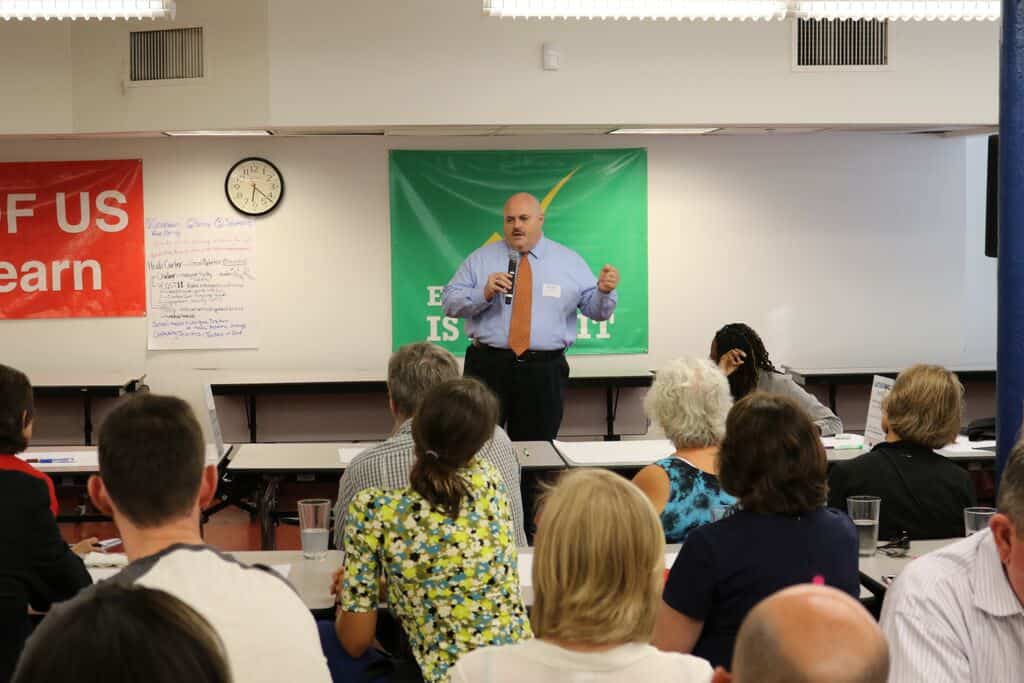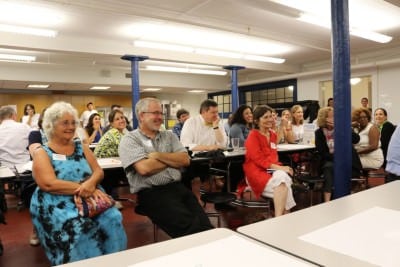Jim Keaten was one of eight children growing up in a poor family in Maine. Even today he can recall the “stigma and embarrassment” of being one of “those kids” who had to eat breakfast in the cafeteria at his school in order to not have a growling stomach when the first class of the day rolled around.
Keaten has made a good life for himself — despite the hardships, and the tragedy, that he faced growing up. Today, he is the nutrition director for Durham Public Schools, and he has built a reputation for looking out for every child. He has stewarded a number of alternative breakfast options that remove the stigma from school breakfast through universal breakfast in some schools, snack packs as a grab and go breakfast in others. He has built a reputation for innovation as he strives to make sure no child goes hungry, while also working on overall nutrition, taste, and more.
Last Thursday, EdNC and the Jamie Kirk Hahn Foundation hosted a Gathering for Good in Durham to discuss summer feeding programs and the issue of childhood hunger across our state.
If you wanted to learn the facts about hunger, then you would have gained something from being among the sixty-plus citizens, elected officials, educators, nonprofit leaders, and food policy experts in the room.
Keaten shared that Durham Public Schools has a $16 million dollar budget for child nutrition — but only $24,000 comes from the state of North Carolina. And he told those assembled in the cafeteria at Maureen Joy Charter School, “Child nutrition does not receive one penny from Durham Public Schools, from the city, from the county.”
As Rose Hoban wrote for NC Health News,
“Listening to a recording of the meeting, one can hear the room fall silent as Keaten made that point. When he told the room he had to pay the district $834,000 last year to cover rent, gas and all of the utilities used in school cafeterias, the clinking of forks on plates had completely stopped.”
If you wanted momentum around child hunger, then you would be energized as well.
Dr. Lynn Harvey, the head of nutrition for the Department of Public Instruction, was present. Kevin Trapani, noted social entrepreneur and the Chairman of the Board for the United Way of the Greater Triangle, was in the room discussing the innovation challenge to come from the United Way and new approaches to funding work in the arena. EdNC was asked to host more Gatherings across the state.
We left the room with a renewed sense of purpose, a burgeoning coalition of groups determined to go to work, and new allies in the fight.
But what struck me throughout the evening was how many of those working so hard to combat hunger, build food systems, and craft a brighter future for all of our children had a personal stake in the policy decisions.
Jim Keaten and I spent a half hour discussing our respective backgrounds over a beer following the main event. We both recalled hunger pangs that we faced as kids, our siblings who had faced even more difficult challenges, and our personal motivation to make sure that fewer children faced what we had at times in our childhood.
Keaten is a hero in the space. Period. But he rejects the label, telling me of the many challenges, and solutions, that nutrition directors across the state are working towards daily.
Reverend Richard Joyner and I met for the first time last Thursday. Reverend Joyner has received growing accolades for his work in Conetoe around child nutrition and agriculture. Yet when he walked in, he carried himself with marked humility. He was unassuming, quick to point out that the solutions that he is working on are driven by the youth in his community.
Reverend Joyner was one of thirteen children growing up. His father pulled him aside one night and told him that if he worked hard he would be able to leave the farm and never look back.
Yet when his path brought him to the pulpit in Conetoe, he presided over thirty funerals in his first year. The pain he saw in the eyes of the families was overpowering at times. He entered therapy. The most painful thing of all was that many of the deaths came from preventable diseases that were mostly the result of poor nutrition. When he went looking for a solution, he realized that he had to go back to the land.
Today, the youth of Conetoe are growing their own food. He argues that they can, “grow their way out of poverty,” but they are also becoming more aware of the role that eating well plays in their life.
Don’t get me wrong, you don’t have to face poverty, or hardship, to make sound policy decisions. You don’t have to know what real hunger feels like to care about children going hungry.
Yet if you were there last Thursday night then you would have seen the passion that comes from understanding that policy is more than numbers on a spreadsheet, or regulations, or a white paper. You would have heard the energy that comes from understanding that we can fix our problems when passion, people, and sound policy come together.
You might even believe, as I did that night, and as I do today, that we can solve childhood hunger in our lifetime.



